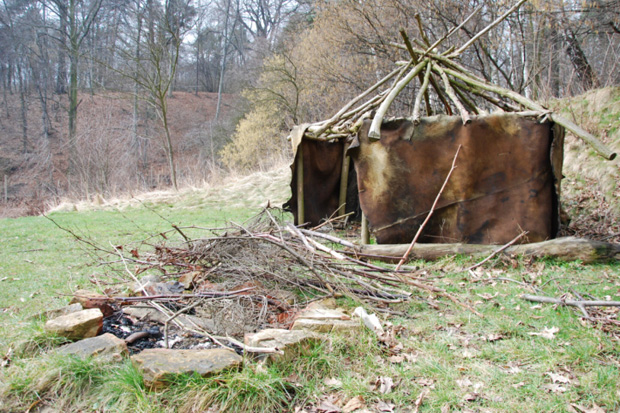Dylan Evans, the author of this book, was one of those oddballs who rather looked forward to the apocalypse, because it promised ‘challenging times ahead’. If, in the not too distant future, famines and droughts more or less wipe us out, that will be our own fault for allowing population levels to reach an unsustainable nine billion — the predicted figure for 2050. How much better the planet will be with a select handful living in their villages of yurts, log cabins, teepees and straw-bale huts, the children gambolling happily ‘amidst the bracken and the trees’. The air will be cleaner. Wildlife ‘will make a comeback’. Neighbours will help each other out. People will be fitter as a result of their manual labour.
Evans couldn’t wait to create his retrograde society, where waif-like girls ‘with long, tawny dreadlocks’ would be doling out ‘bowls of bean stew from a steaming cauldron’. He sold his house, gave up his academic career and moved to a field near Inverness. He looked at an adjacent waterfall and thought it could ‘generate electricity’. He gazed at an acre of scrubland and believed he could ‘keep a few pigs and chickens’. He spotted a deer and, though he had no butchery or tanning training, imagined turning its hide into shoes and gloves.
Fair play to Evans: by the time he came to write this book he realised he was delusional. Though he had no difficulty recruiting like-minded eccentrics to join him in his ‘experimental community’ (a former Royal Marine who had ambitions to be a cobbler; a computer-programmer ‘passionate about vegetables’; a teacher who’d once met an Inuit; a graffiti artist from Belfast; a Cambridge student keen on the recorder), Evans admits that his utopia was doomed to failure. It attracted only idealists and disaffected romantics when what was needed were people with practical skills, like plumbers, carpenters and engineers. Soon the militant vegetarians were squabbling with the meat-eaters, and the small group began to disintegrate. One member even started to invent his own religion, building a shrine with ‘carefully arranged’ bits of driftwood and old coins.
Those who didn’t behave like Gandalf became like ‘hobbits on speed’, says Evans. He himself was soon fed up with sleeping under rancid fleece blankets and wearing clothes woven from sisal ‘to ward off mosquitoes’. You couldn’t make a brew, as ‘there wouldn’t be tea in Scotland after civilisation collapsed’. There was neither soap nor detergent. ‘We got used to a thin layer of slime covering the pans and bowls.’ There was no toothpaste or lavatory paper — the sanitary arrangements were grotesque. There was also no music.
What Evans calls ‘preparing for the end of the world’ was in actuality deadly boring — getting fires going, keeping dry, trying to prevent small cuts from becoming infected and eating nothing save thick lentil soup. It soon became apparent that ‘the whole experiment had been a huge mistake’. Jittery, with a permanently wide-eyed expression and wanting only to kill himself, Evans was eventually detained under the Mental Health Act in a maximum security psychiatric hospital.
Here the students of the mind explained to him that his project had been bonkers from the beginning. He fretted unduly about global warming and ‘the looming energy crisis’, he was convinced that deforestation would result in soil erosion, and that with no trees he’d be unable to build canoes and go fishing once the supermarkets had vanished… Evans, the doctors concluded, was already craving the abyss and in the throes of panic-attacks and a breakdown. Bored sick in utopia, Evans had been bored to distraction before, when he was an academic, seeing no ‘passion or joy’ in his pampered and safely salaried public-sector existence.
That’s one explanation: that no sane person shouts, ‘Stuff your pension!’ and clears off to a field near Inverness. Another is that designs for living always end in tears, or worse. From the Russian Revolution to Jonestown, programmes for human happiness come a cropper. It’s best to muddle along as we are, not because human beings are morons or suckers, or traitors to the cause, but because life is meant to be messy, muddled, contrary, comic. In any event, when the balloon goes up, I have my plan ready. I shall hide in the stockroom at Morrison’s (Strood branch), spending what’s left of eternity scoffing their individual fruit pies.






Comments